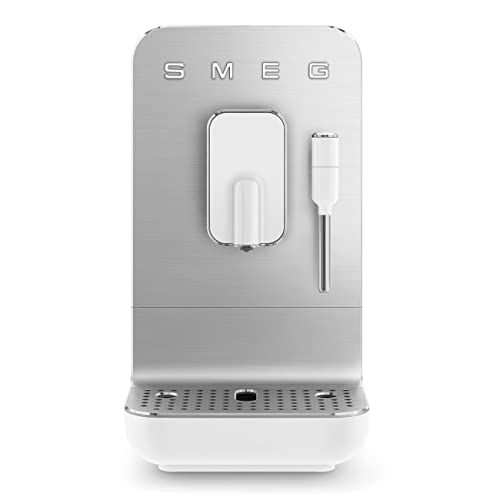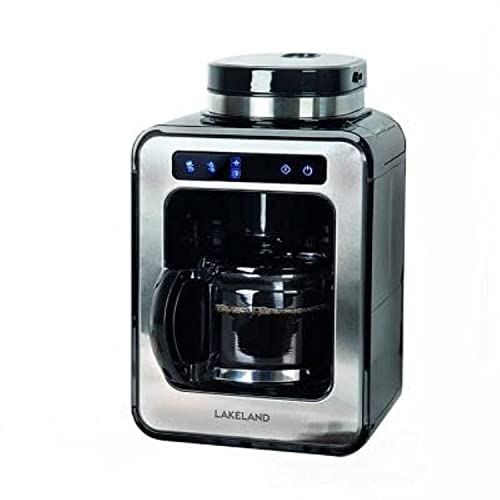Its History Of Coffee Bean Coffee Machine
페이지 정보
작성자 Shani De Maistr… 작성일 25-01-23 08:53 조회 29 댓글 0본문
 Bean-to-Cup Coffee Machines
Bean-to-Cup Coffee MachinesBean-to-cup machines can be ideal for those mornings that are dreary and you simply want to hit the button to get your morning caffeine fix. They offer a certain degree of flexibility for more adventurous drinkers.
 They work by storing the entire beans in a hopper before grinding them prior to brewing. Then, they serve a beverage with a touch of a key. They are able to serve customers and employees without the need for a trained barista.
They work by storing the entire beans in a hopper before grinding them prior to brewing. Then, they serve a beverage with a touch of a key. They are able to serve customers and employees without the need for a trained barista.Cost-effectiveness
Whether you prefer the traditional taste of freshly ground beans or the convenience of pre-packaged coffee pods, each has pros and cons. Cost-effectiveness is the key consideration. Bean-to-cup machines are a more economical option for long-term use than pod-based models. They can help you avoid regular expenses by purchasing bulk premium beans that can be purchased at a lower price than pods. Additionally, they can reduce consumption by eliminating the need to dispose of coffee pods.
Bean-to-cup coffee makers are ideal for office settings, as they're simple to use. Contrary to manual drip coffee makers that require users to grind beans and prepare them manually, bean-to-cup machines offer a smooth, consistent coffee at the touch of an button. In addition, these machines are designed with low maintenance and cleaning in mind. Additionally, many have integrated cleaning and rinsing programs that make it simple to keep them running smoothly.
The most significant benefit of a Bean-to Cup machine is its ease-of-use. It is usually simple to install and use, and requires no previous training to operate. It has a built-in milk frother as well as a grinder. This makes it ideal for businesses that have only a few employees. Furthermore, it can provide high-quality coffee at the push of an button, which is especially convenient for busy offices.
It may be more costly to buy a bean-to cup machine than a pod-based model however it can save you money over time by reducing your energy and supply costs. Additionally, it is eco more sustainable than pod-based machines because it produces less waste and uses fewer natural resources.
Coffee for your employees is an excellent way to boost productivity and morale. By providing a machine that makes coffee in the break room, you can create an environment that encourages collaboration and teamwork. Additionally it can promote interaction between your employees by promoting informal conversations. In these conversations employees can share ideas and come up with creative solutions to problems. Additionally, a cup of coffee can give your brain a stimulation and spark creativity.
Convenience
Bean-to cup coffee machines are an affordable method of providing high-quality coffee with the push of a button. They are simple to use and require little maintenance. They have built-in grinders that ensure your beans are freshly grounded for each cup. They can be programmed to make a variety of different drinks with the click of a button, including hot and cold beverages. This allows you to create different drinks for your customers and employees.
Additionally, a bean to cup coffee machine will allow you to save money by eliminating the necessity for paper filters and plastic cups. It will also reduce the amount of coffee grounds that end up in landfills. If you're concerned about the environment, you can choose a coffee machine that uses whole beans that are organic to give the most sustainable experience.
Bean-to-cup machines are easier to use than pod coffee machines. They require minimal or no instruction. The user is required to top off the water tank and bean hopper prior to selecting the desired beverage from the machine's user-friendly control panel. Some coffee bean machines have options to adjust the strength and temperature settings.
The pod coffee machines utilize powdered coffee that is pre-ground The bean to cup home coffee machine-to-cup machine grinds whole beans prior to making each cup of coffee. This preserves the aroma and flavor of the beans, leading to an authentic flavor and texture. They are also able to customize each cup of coffee to the user's preferences, allowing them to learn about their preferences throughout the day. Barista Smart is a great example of a machine like this. It can be programmed for 21 different types including black to espresso coffee machines that use beans.
A Bean to cup home coffee machine-to-cup machine also has rinse cycles prior to turning off and when first turned on to prevent the build-up of coffee residues on milk dispenser and spouts. In addition, it has an internal bin that can be used to store leftover coffee grounds and milk. This bin doesn't need to be cleaned out every day and usually comes with an indication on the screen when it is full.
Freshness
Fresh-brewed coffee is not only delicious however, it also has a variety of health benefits. It can increase the metabolism, lower the risk of heart disease and provide you with an energy boost naturally. However, it is important to choose the right beans for your machine. Choose whole bean coffees with a a clearly marked roast date to ensure the highest quality and taste for your coffee. This is crucial for bean-to-cup machines that require freshly roasted ground coffee beans. Coffee beans that have been roasted for a long time will be bitter taste and lack flavor.
The shelf life of whole coffee beans is influenced by several factors including temperature and storage conditions. Whole beans that are not opened can be kept for up to six months after roasting if stored in a proper manner. Once the beans have been ground, the shelf-life of the beans decreases due the increased exposure to oxygen. In general, it is recommended to use freshly-ground beans within two weeks of opening or grinding.
The appearance of beans can be another way to determine if your coffee is fresh. Fresh whole beans will have a shiny appearance while older coffee beans will look dull and dry. The smell of the beans may aid in determining whether they are fresh or not.
When coffee beans are roast, they release volatile aromatic oils that carries the flavor of the beans. These oils are responsible for the distinct flavor of each coffee and if they lose their potency, the flavor of the brewed coffee will be diminished. To avoid this, make sure to buy coffee beans that have a clear roasting date and store them in an airtight jar.
It is also recommended to grind the coffee a few days before the date you intend to make it. This will reduce the oxidation and ensure that you get the best flavor. Avoid storing the beans in the refrigerator, as this can cause the structure to be damaged or cause moisture accumulation.
The hopper is a crucial component of any bean to cup machine, and must be cleaned regularly to remove excess dirt and water. Cleaning the hopper can help keep it clear of blockages and improve the overall performance of the machine. This can be done by getting rid of the hopper from the machine every day and washing it with hot water, and wiping it dry with a cloth to remove any buildup or dust.
Sustainability
The most sustainable option is to purchase beans that have been grown and processed sustainably, regardless of whether you're using an instant cup, filter, or capsule. By selecting brands that are sustainable or purchasing beans that are UTZ or fair trade certified, you can reduce the amount of waste generated during roasting and packaging processes. These certifications ensure that farmers who grow the beans get a fair amount of money and are in good working conditions.
Coffee beans are the largest source of greenhouse gas emissions. The amount can vary between 40 and 80percent. This is due to the fact that large corporations use intensive irrigation, fertilizers, and pesticides to increase the productivity of their crops. This causes deforestation, pollutes water sources, and kills different species. It also causes soil erosion that results in climate change and a degrading of the land.
By choosing a bean to cup machine it will allow you to reduce the carbon footprint of your coffee by avoiding plastic cups and paper cups. You can go even further and share the machine with a friend to cut down on energy usage. Another method to lessen the environmental impact of your coffee is to buy a green refillable pod that is able to be used several times.
Espresso machines are more efficient now because of the growing attention to sustainability. They make use of less electricity. Some are made of recycled materials and some are 100 percent compostable. This means that they'll turn into a biomaterial within 84 days after disposal. You can help reduce the waste problem by encouraging your colleagues to use reusable mugs or tumblers and by offering the composting of coffee grounds. You can also help by donating to charities that support sustainable coffee production. You can also minimize the environmental impact of your coffee by avoiding single use accessories such as stirrers or sweeteners.
댓글목록 0
등록된 댓글이 없습니다.
